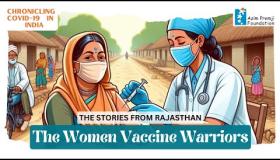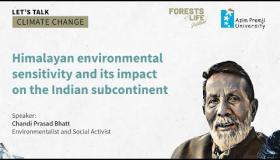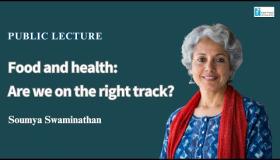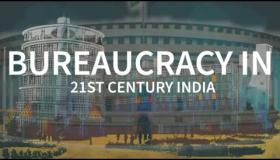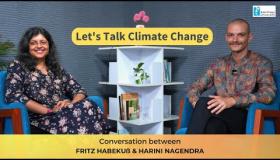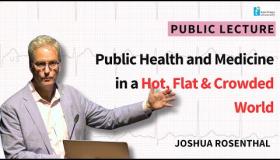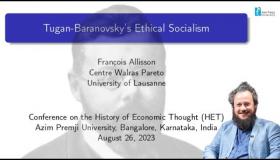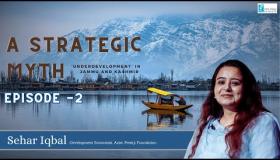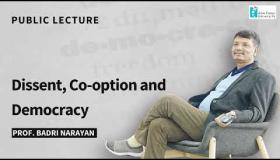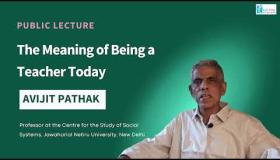
Azim Premji University regularly organises various events involving faculty members as well as academicians, activists, artists, and other distinguished personalities from a wide array of fields. This section is a reflection of those events.
The Women Vaccine Warriors: COVID-19 Stories from Rajasthan
This documentary photo story features the experiences of eleven women frontline heroes of Rajasthan, involved in the Vaccination Abhiyan of the state. They include a few chosen ASHAs, ANMs, nurses, Tehsildar, Pradhan and Anganwadi workers, as a representative of all such heroic women of India who worked day and night, to ensure all the people get two dosages of the COVID-19 vaccinations. This is the third COVID-19 story from Rajasthan, as part of the “Chronicling COVID-19 in India – Through the Eyes, Ears, and Feelings of People on the Ground" series, in which we feature the COVID-19 unsung heroes.
Public Lecture: Himalayan Environmental Sensitivity and its Impact on the Indian Subcontinent
Depriving the people of Uttarakhand from the free use of land, forest and water began in the 19th century when the British started taking the forests and land in the possession of the government. The commercial exploitation of forests continued after independence so much so that untouched forest areas started coming under motor roads. Such exploitation led to the process of landslide and land erosion in the catchment areas of the rivers originating from the Himalayan region and the rivers began to flood. This led to the death of thousands of people, the destruction of property every year, and also affected development projects. One such event was the devastating flood in Alaknanda on 20 July 1970. It was from the agitation of the Chipko Movement that in 1977 the forest department stopped the felling of trees in the sensitive areas of Alaknanda thereby cancelling the department’s 10-year Working Plan in the region. Chandi Prasad Bhatt sheds light on how sensitive the forest cover in this Himalayan region is and how deforestation and commercial exploitation have been drastically resulting in natural calamity and affecting the livelihoods of the villagers. He also talks about ways of conservation in this region.
Chandi Prasad Bhatt is an Indian Gandhian environmentalist and social activist who founded Dasholi Gram Swarajya Sangh (DGSS) in Gopeshwar in 1964. It later became a mother organisation to the Chipko Movement, in which he was one of the pioneers. For his unparalleled contribution to the movement, he was awarded the Ramon Magsaysay Award for Community Leadership in 1982, followed by the Padma Bhushan in 2005. Today he is known for his work on subaltern social ecology and is considered one of India's first modern environmentalists.
Public Lecture | Food and Health: Are We on the Right Track?
Global disability and early mortality risks hinge on diets. Dietary guidance mitigates chronic diseases, emphasising diverse, low-salt, low-sugar, and low-trans-fat intake. Food waste contributes 8% to greenhouse gas emissions; 870 million face undernourishment. A third of global food production (1.3 billion tons) is lost or wasted annually. Lifestyle changes, such as reducing salt and sugar, are vital for preventing non-communicable diseases. Labeling regulations need strengthening for transparent information. Climate change threatens food supplies globally, impacting health and the planet. In this lecture, Dr. Soumya Swaminathan addresses how dietary choices affect individual and planetary well-being.
Soumya Swaminathan, former WHO Chief Scientist and Deputy Director-General for Programmes, is now Chairperson of the M S Swaminathan Research Foundation (MSSRF) since February 2023. With 30 years of experience in pediatrics, clinical care, and global research on tuberculosis and HIV, she has contributed significantly to translating research into impactful health programmes. Dr. Swaminathan held key positions in the Indian government, including Secretary for Health Research and Director General of the Indian Council of Medical Research. She has an extensive academic background and over 480 peer-reviewed publications. Recognised globally, she is a Fellow of the US National Academy of Medicine, the Academy of Medical Sciences (UK), and Indian science academies. Dr. Swaminathan serves on various advisory bodies, holds adjunct professorships at Karolinska University and Tufts University, and is a Board Member of organisations such as CEPI and FIND. In her role as WHO's inaugural Chief Scientist, she led the Science division, focusing on research, quality assurance, and digital health. Notably, she played a key role in coordinating global scientific efforts during the pandemic and establishing Covax for equitable vaccine distribution to low- and middle-income countries.
Bureaucracy in 21st Century India
Catch this exclusive interview with Shumsher K. Sheriff, former Secretary General, Rajya Sabha in which Srikrishna Ayyangar, Faculty, Azim Premji University engages Mr. Sheriff about his diverse experience spanning forty years in the public service, the complimentary nature of legislative and executive, the evolution of India as a democracy as seen through his eyes, the intrinsic strength that this democracy holds, and how the bureaucratic systems function. Get to also know the story behind the spelling of his name and what is it that Mr. Sheriff looks forward to post-retirement.
Shumsher K. Sheriff, a civil servant of four decades joined the IAS in 1977. He studied at St. Stephen’s College and has a Law degree from Delhi University. He is also an alumnus of the Graduate Institute of International Studies in Geneva, Switzerland and the JFK School of Governance, Harvard, USA. He was the first Indian to graduate(CSE)from the Ecole Nationale d’ Administration (ENA) in France. He has worked at various government positions in India at the state and central levels including the North-East and Finance Ministry. He was Principal Home Secretary Delhi and Chief Secretary of Andaman & Nicobar Islands where he was responsible for Tsunami rehabilitation. He has been Advisor on the Board of Directors of the Asian Development Bank (ADB). As Secretary to two Vice Presidents and a President of India he advised on constitutional, legislative, and international affairs. In 2011, he was made Secretary to Government of India and later served as Secretary-General of Rajya Sabha from 2012 -2017. He has been on the Executive Committee of the Association of Secretaries General of Parliaments in Switzerland and was associated with the Commonwealth Parliaments. In recognition for his ‘outstanding and consistent contribution’ he was made a lifetime honorary member of the Association in 2018.
Let's Talk Climate Change Interview
Dive into an engaging conversation with Fritz Habakus, a seasoned environmental journalist from Germany, as he sits down for an insightful interview with renowned Indian ecologist, Professor Harini Nagendra. This interview is part of Azim Premji University's thought-provoking series, "Let's Talk Climate Change."
Fritz's unique perspective on being an environmental journalist and his experiences covering human-nature interactions. Insights into the challenges and evolution of environmental journalism globally. The impact of climate change on societies and cultures, as explored through Fritz's lens. Harini Nagendra's personal reflections on ecological conflicts and the carbon footprint dilemma faced by researchers. Subscribe to Azim Premji University for more thought-provoking discussions on climate change, sustainability, and the intricate tapestry that weaves together humanity and the environment. Like, share, and let's collectively spark conversations that leads to positive change.
Public Lecture: Public Health in a Hot, Flat and Crowded World
New York Times Journalist Thomas Friedman described the convergence of global warming, globalization, and population growth as the dominant challenge for 21st Century in his 2008 book, “Hot, flat and crowded.” Focused primarily on economic well-being, Friedman looks especially to investments in green technology to transform energy, and thus mitigate global warming and stimulate equitable economic growth. However, the scientific consensus today is that even if average economic well-being is maintained or increased in the coming decades, other measures of well-being, especially population health, will likely suffer with massive challenges to the environmental conditions that sustain life on our planet. Changing patterns of infectious diseases, mental and cardiovascular health are already apparent around the world, especially in countries such as India, where socio-economic and environmental conditions are already strained. Environmentally driven changes to the health landscape will almost certainly accelerate in the coming years. Thus, while we endeavor to slow global warming through social and economic transformation, we must also anticipate unavoidable changes to the socio-ecological and public health systems that enable well-being. We must make well-informed adaptations in urban planning, agriculture, energy, water use, transportation and health service delivery, among other sectors, to keep people and our environments healthy. We have learned some valuable lessons in partnerships across community organizations, universities, companies and governments around the world, and it’s abundantly clear that this is an “all hands on deck” moment that requires active participation and vigilance from all citizens.
Joshua Rosenthal is a Senior Scientist at the Fogarty International Center of the U.S. National Institutes of Health (NIH), and currently a Fulbright Kalam Climate Scholar in India. He is an ecologist with a longstanding interest in the integration of public health, environment, and international development. Josh has developed, led and conducted NIH research and training programs on environment and health in many countries around the world, including in India. His recent work is focused primarily on reducing household air pollution from cooking with solid fuels, and on research programs to reduce the health impacts of climate change. During his Fulbright Kalam fellowship, he is working with faculty at Sri Ramachandra Institute of Higher Education and Research in Chennai to create a new curriculum on Climate Change and Health for public health professionals.
Public Lecture: Tugan-Baranovsky's Ethical Socialism
The Russian/Ukrainian economist Mikhail Tugan-Baranovsky once wrote that “Every accomplished social system consists of three parts: of the criticism of the existing social conditions, of a determined conception of the future organization, and of considerations regarding the ways and means by which its principles are to be carried out in actual fact.” (1910, p. 185). This presentation reconstructs Tugan-Baranovsky’s ideas about the critique of capitalism and about the organization of the future society, by showing the role that ethics plays in both. His legacy constitutes a reminder that, while looking for a brighter future, one shall reconsider the distinction between positive and normative economics, to favor incursions into normative economics.
Dr. François Allisson is Senior Lecturer in the history of economic thought at the Walras Pareto Centre, University of Lausanne in Switzerland. He works on value, on Russian economic thought – topic of his first book, Value and Prices in Russian Economic Thought (Routledge, 2015) – and on capitalism – topic of his second book, coauthored with Nicolas Brisset (Université Côte d’Azur), Aux origines du capitalisme. Robert Brenner et le marxisme politique (ENS Editions, 2023).
A Strategic Myth: Land Reforms and their Impact in Jammu Kashmir- Sehar Iqbal
In the second episode of the series on Kashmir based on a book authored by Sehar Iqbal, we talk about the dramatic land reforms that changed the course of politics and economics in the state. This book dispels common myths about Jammu and Kashmir by proving that it was a developed state with little poverty, high life expectancy and low income inequality, even before 2019. It uses statistics from a series of government reports in support of its arguments. Academics across the country have praised its findings, especially the depth of research on land reforms in Jammu and Kashmir.
The author is an economist who hails from Anantnag in south Kashmir and works with Azim Premji Foundation.
Public Lecture | Dissent, Co-Option and Democracy: Multiple Trajectories of Empowerment
Professor Badri Narayan critically examines the changing role of dissent and emerging trends of cooption in the process of deepening Democracy in India. He focuses on understanding the multiple trajectories of empowerment in India, especially new forms of empowerment processes, which are evolving due to the ongoing democratic interaction between the state and the public.
Prof. Badri Narayan, a social historian and cultural anthropologist is Director, G B Pant Social Science Institute, Allahabad. He was recently honoured with the prestigious Ambedkar Chair of Punjab University, Chandigarh. His interests lie in popular culture, social and anthropological history, Dalit and subaltern issues, and the relationship between power and culture.
Besides having written several articles both in English and Hindi, he has recently authored ‘Republic of Hindutva: How the Sangh Is Reshaping Indian Democracy’, Gurgaon, Penguin Random House,2021.
His other critically acclaimed books are ‘Fractured Tales: Invisibles in Indian Democracy’, Oxford University Press, New Delhi; ‘Kashriram’, by Penguin (2014); ‘The Making of the Dalit Public in North India: Uttar Pradesh 1950-present’ by Oxford University Press (2011); ‘Women Heroes and Dalit Assertion in North India’, by Sage Publication, New Delhi 2006; ‘Fascinating Hindutva – Saffron Politics and Dalit Mobilisation’, by Sage Publication, New Delhi.
Public Lecture | The Meaning of Being a Teacher Today
Is it possible to celebrate the art of a creatively nuanced and reflexive critical pedagogy in a dialogic classroom, particularly today when the neoliberal assault on education seems to have transformed it into a mere market-driven technical skill and reduced students into greedy consumers of the well-packaged mythologies of 'placements and salary packages'? Or, for that matter, can students and teachers as co-travelers learn and unlearn through free-floating conversations, nuanced debates, and dialogues, particularly when all sorts of psychic and symbolic violence amid diverse chains of the surveillance machinery have generated an environment of fear and mistrust? The lecture seeks to reflect on the challenges that confront the teaching community today.
Prof. Avijit Pathak is a distinguished scholar who retired as a Professor from the Centre for the Study of Social Systems, School of Social Sciences, Jawaharlal Nehru University (JNU), New Delhi, after a dedicated teaching career spanning 31 years. With a profound influence on the realms of sociology and education, he has earned a reputation as one of the most authoritative and genuine thinkers in Indian academia. Beyond his academic contributions, he has also made a significant impact as a journalist, lending his insights to prominent publications like The Wire, The Indian Express, and The Tribune. His ability to bridge the gap between academia and journalism has further enriched public discourse on social, cultural, and educational issues.
Prof. Pathak's academic pursuits have culminated in several noteworthy books, including Ten Lectures on Education, Indian Modernity, Education and Moral Quest, and Social Implications of Schooling, to name a few. Throughout his career, he has not only contributed to the academic community through his research and writings but has also played a crucial role in shaping the broader discourse on education, sociology, and social systems. His legacy as a scholar, educationist, and journalist continues to inspire those who engage with his ideas, encouraging critical thinking and a deeper understanding of the complex issues facing contemporary society.

